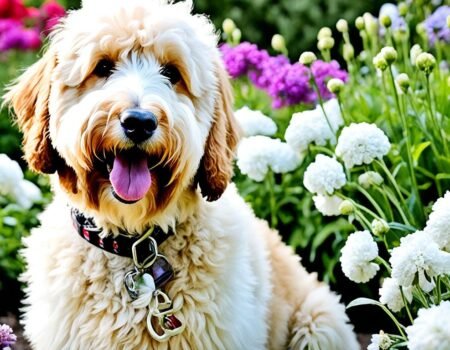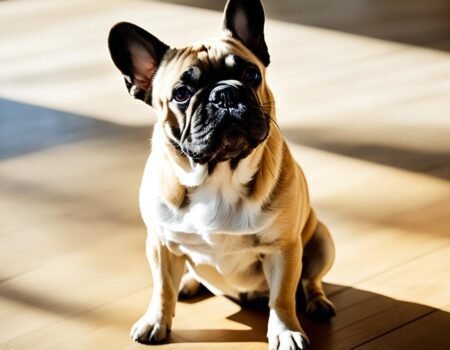Hey Did you know that there is a rare and captivating breed of French Bulldog with long hair? Yes, you read that right! While the typical French Bulldog is known for its short, sleek coat, there is a lesser-known variant that boasts a fluffy and luxurious mane. Meet the long-haired French Bulldog, also known as the Fluffy Frenchie!
In this comprehensive guide, I will provide you with all the information you need to know about the long-haired French Bulldog. From its history and physical features to its general care, health concerns, temperament, and more, you will discover everything you need to become an expert on this unique breed.
So, let’s dive in and unravel the fascinating world of the long-haired French Bulldog!
Key Takeaways:
- The long-haired French Bulldog is a unique and captivating variant of the breed.
- They have a fluffy and luxurious coat instead of the typical short coat.
- This comprehensive guide will provide you with all the information you need to know about the long-haired French Bulldog.
- Topics covered include history, physical features, general care, health concerns, temperament, and more.
- Stay tuned and unlock the secrets of this adorable and special breed!
History of the Fluffy Frenchie
Despite being called “French Bulldog,” this breed actually originated in England. They were initially bred for bull-baiting but later became popular companion animals. Lace workers from England brought these dogs to France, where they gained popularity among the upper classes. Famous people, such as Henri de Toulouse-Lautrec, also owned French Bulldogs. The breed was recognized by the American Kennel Club in 1898.
Origin of the French Bulldog
The French Bulldog may have “French” in its name, but its origins can be traced back to England. In the early 19th century, bulldogs were crossed with terrier-type dogs to create a smaller breed suitable for companion purposes. These small bulldogs were popular among lace workers in Nottingham, England.
Super Popular in France
In the late 1800s, lace workers from Nottingham migrated to France due to the decline of the lace industry in England. They brought their beloved bulldogs with them, where the breed quickly gained popularity. French society, including artists and writers, embraced the French Bulldog for its unique appearance and affectionate nature.
“The French Bulldog quickly became a symbol of sophistication and style among the upper classes in France. Its playful personality and charming looks made it a beloved companion for many.” – Renowned French dog historian, Jean-Pierre LeFrenchie
Recognized by the American Kennel Club
The French Bulldog’s popularity spread beyond Europe, catching the attention of dog enthusiasts in America. In 1898, the American Kennel Club officially recognized the breed. Since then, French Bulldogs have become one of the most popular dog breeds in the United States. Check it out!!
| Year | Event |
|---|---|
| 1835 | French Bulldog breed emerges in England |
| 1860s | Lace workers from England bring French Bulldogs to France |
| 1898 | American Kennel Club recognizes the French Bulldog breed |
In conclusion, the history of the Fluffy Frenchie is a fascinating tale of cross-continental journeys and enduring popularity. From its origins in England to its rise in popularity among the upper classes in France, the French Bulldog has captured the hearts of dog lovers around the world. Recognized by the American Kennel Club, the Fluffy Frenchie continues to charm and delight families with its cool looks and lovable personality.
Physical Features of a Fluffy Frenchie
Fluffy Frenchies, also known as long-haired French Bulldogs, have distinct physical features that set them apart from their smooth-coated counterparts. These adorable pups have a small, muscular body that exudes charm and charisma. With a square head and those iconic bat ears, they have an irresistible charm that melts hearts.
One of the most notable characteristics of Fluffy Frenchies is their medium-length, fluffy coat. This luxurious coat comes in a variety of stunning colors, including black, fawn, brindle, blue, cream, and merle. Each color adds a unique touch to their already adorable appearance, making them even more distinctive and eye-catching.
When it comes to size, Fluffy Frenchies are compact and petite. As they reach adulthood, they typically stand between 11-13 inches tall at the shoulder. Despite their small stature, these little furballs have a sturdy build and a surprising amount of strength.
In terms of weight, Fluffy Frenchies usually range between 16-28 pounds, depending on factors such as genetics, diet, and exercise. Their weight can vary within this range, but it’s essential to monitor their weight and ensure they maintain a healthy size to support their overall well-being.
Fluffy Frenchies have an average lifespan of around 10-14 years. This means that with proper care and attention, you can enjoy many memorable moments and experiences with your beloved Fluffy Frenchie throughout their lifetime.
Genetics of the Fluff: Where does the longer hair come from?
The longer hair in Fluffy Frenchies is a fascinating characteristic that is determined by genetics. Two main genetic factors contribute to the longer hair in this breed – the LH gene and the Fibroblast Growth Factor 5 (FGF5) gene.
The LH gene, also known as the “long hair gene,” plays a key role in determining the length of the French Bulldog’s coat. It is responsible for the development of the longer, fluffier hair seen in Fluffy Frenchies. The presence of the LH gene can be identified through genetic testing, allowing breeders to selectively breed for this desirable trait.
Another genetic factor that influences the longer hair in Fluffy Frenchies is the Fibroblast Growth Factor 5 (FGF5) gene. This gene regulates hair growth and determines the length of the hair follicles. Variations in the FGF5 gene can result in different hair lengths, including the longer hair characteristic of Fluffy Frenchies.
When it comes to the inheritance pattern of the long hair gene, it follows a Mendelian recessive trait. This means that both the LH gene and the FGF5 gene must be present in order for the longer hair trait to be expressed. Fluffy Frenchies can have two copies of the long hair gene (LH/LH), one copy (LH/SH), or no copies (SH/SH).
Understanding the genetics behind the long-haired French Bulldog not only helps breeders selectively breed for this trait but also provides valuable insights into the inheritance patterns of coat characteristics in this beloved breed.
Genetic Variations and Hair Length in Fluffy Frenchies . Look at this chart I put together guys!!
| Genetic Variation | Hair Length |
|---|---|
| LH/LH | Long hair |
| LH/SH | Varying hair length |
| SH/SH | Short hair |
General Care of a Long-Haired Frenchie
Taking care of a long-haired French Bulldog requires special attention and understanding of their unique needs. Here is an overview of the essential aspects of their care:
Traits and Energy Level
A long-haired French Bulldog possesses all the adorable traits of their short-haired counterparts, but with the added charm of long, fluffy hair. They have a moderate energy level and enjoy daily exercise to keep them physically and mentally stimulated.
Exercise and Housing
A 30-minute walk or playtime in the park is usually sufficient to meet their exercise needs. Despite their small size, long-haired Frenchies can adapt well to apartment living as long as they have access to fresh air and regular opportunities to explore the outside world.
Food and Dietary Requirements
A high-protein diet is essential for the health and well-being of your long-haired Frenchie. Choose high-quality dog food that meets their nutritional needs. Consult with a veterinarian to determine the appropriate portion size and feeding frequency for your furry friend.
Grooming
Grooming is a crucial part of caring for a long-haired French Bulldog. Regular brushing helps to prevent matting and keeps their coat clean and tangle-free. In addition, cleaning their ears regularly and trimming their nails is essential for their overall hygiene and comfort.
Overall, providing proper care, exercise, and a balanced diet, along with regular grooming, will ensure your long-haired Frenchie remains healthy and happy.
| Care Aspect | Description |
|---|---|
| Traits and Energy Level | Moderate energy level, daily exercise required |
| Exercise and Housing | 30-minute walk or playtime, adaptable to apartment living |
| Food and Dietary Requirements | High-protein diet, balanced nutrition |
| Grooming | Regular brushing, ear cleaning, and nail trimming |
Health Concerns of a Fluffy Frenchie
As adorable and charming as they are, Fluffy Frenchies are prone to certain health concerns due to their genetics and breed characteristics. It is crucial for owners to be aware of these potential issues and take proactive measures to ensure their furry friends live happy and healthy lives.
Breathing Problems
One of the most common health concerns among Fluffy Frenchies is their susceptibility to breathing problems. Their unique facial structure, including a flat nose and pushed-in muzzle, can result in respiratory challenges. This condition, known as Brachycephalic Airway Syndrome, can cause difficulty in breathing, snoring, and even heat intolerance.
Spinal Issues
Fluffy Frenchies are also prone to spinal issues, specifically Intervertebral Disc Disease (IVDD). Their elongated spines and short legs put them at a higher risk of developing herniated discs, which can cause pain, mobility issues, and in severe cases, paralysis.
Eye Problems
Another health concern for Fluffy Frenchies is eye problems. Due to their prominent and protruding eyes, they are more susceptible to conditions like cherry eye, corneal ulceration, and dry eye. Regular eye examinations and proper care are necessary to maintain good ocular health.
Ear Infections
Fluffy Frenchies’ adorable bat-like ears are not just a characteristic feature; they can also be prone to ear infections. The narrowed ear canals and trapped moisture can create an environment that promotes bacterial or fungal growth. Regular ear cleaning and monitoring can help prevent painful ear infections.
Allergies
Allergies are another health concern that Fluffy Frenchies may face. They can develop allergies to various environmental factors, including pollen, dust mites, certain foods, or even flea bites. Common symptoms of allergies in dogs include itching, redness, skin irritation, and gastrointestinal issues.
Obesity
Fluffy Frenchies can be prone to obesity if not properly managed. Their compact size and tendency to be food enthusiasts can lead to weight gain if their diet and exercise routines are not carefully regulated. Obesity can exacerbate other health issues and impact the overall quality of life for these furry companions.
Proper healthcare, regular check-ups with a veterinarian, and a balanced diet can significantly help in managing and preventing these health concerns. Being proactive and attentive to your Fluffy Frenchie’s well-being will ensure they live a happy and healthy life.
Temperament and Trainability of the Fluffy Frenchie
Fluffy Frenchies are known for their friendly and affectionate temperament. They are sociable and love to be around people, making them great companions for individuals and families alike. Their playful nature brings joy to every household.
One of the standout qualities of the Fluffy Frenchie is their loyalty. Once they have formed a bond with their owner, they will remain devoted and protective. Their loyalty extends beyond their immediate family and can extend to extended family members and friends.
When it comes to trainability, Fluffy Frenchies are intelligent and eager to please. With consistent training and positive reinforcement, they can quickly learn commands and tricks. They thrive in environments where their training is reinforced daily.
“The playful and sociable nature of Fluffy Frenchies makes them a joy to train. Consistency and positive reinforcement are key in shaping their behavior and ensuring they are well-behaved companions.”
Although Fluffy Frenchies are generally docile and easy to train, they can sometimes show a stubborn streak. It is essential to establish yourself as the firm but fair leader to maintain their trainability. Patience, consistency, and positive reinforcement will yield the best results.
Overall, the temperament of Fluffy Frenchies makes them excellent pets for various households. Their affectionate and sociable nature, combined with their playfulness and loyalty, creates a furry companion that brings joy and love into your life.
| Affectionate | Sociable | Playful | Loyal | Trainability | Docile |
|---|---|---|---|---|---|
| ✔ | ✔ | ✔ | ✔ | ✔ | ✔ |
Sociability with Children and Other Pets
Fluffy Frenchies are known for their sociability and get along well with both children and other pets. They have a gentle and patient nature, making them great companions for kids.
When properly introduced and socialized, Fluffy Frenchies can build strong bonds with cats, dogs, and other animals in the household. Their friendly disposition and playful nature make them excellent playmates for children of all ages.
The sociability of Fluffy Frenchies stems from their innate desire to be part of a pack and their love for human companionship. These dogs thrive in an environment where they can interact with people and other animals regularly.
Having a Fluffy Frenchie in the family can create a harmonious and joyful atmosphere, bringing smiles to everyone’s faces.
“A Fluffy Frenchie is not only a loyal family member but also a best friend to children and a loving companion to other pets. Their sociability adds a special touch to any household.”
A Suitable Home for a Fluffy Frenchie
Fluffy Frenchies make fantastic pets and can thrive in various types of homes. Whether you live in a spacious house or a cozy apartment, these adorable companions will adapt to their surroundings with ease. Their low energy levels and quiet nature make them particularly well-suited to apartment living, where they can comfortably reside alongside their human families.
Families are the perfect fit for Fluffy Frenchies, as they crave companionship and thrive on love and attention. They are social animals that enjoy being around people and forming strong bonds with their owners. If you have children, rest assured that Fluffy Frenchies are generally good with kids, known for their gentle and patient nature.
It’s important to note that Fluffy Frenchies don’t like being alone for long periods. They crave human interaction and can become unhappy if left alone for extended periods. Therefore, homes with individuals or families who spend a lot of time at home are ideal for these affectionate and sociable dogs.
“Fluffy Frenchies are adaptable and well-suited for apartment living, making them excellent companions for families who can provide them with ample love and attention.”
Conclusion
In conclusion, the long-haired French Bulldog, also known as the Fluffy Frenchie, is a unique and charming breed that requires specific care and attention. These adorable dogs make wonderful companions for individuals or families who can provide them with the love and care they need.
With proper care, training, and a loving environment, Fluffy Frenchies can bring joy and happiness to their owners for many years. It is essential to understand their physical features, genetic characteristics, and health concerns to ensure their well-being. Additionally, their friendly temperament, sociability with children and other pets, and adaptability to different living situations make them an excellent choice for a furry family member.
Whether you are a first-time dog owner or an experienced pet lover, owning a long-haired French Bulldog can be a rewarding and fulfilling experience. By following the general care guidelines, providing regular vet check-ups, and meeting their specific dietary and grooming needs, you can enjoy a loving and long-lasting bond with your Fluffy Frenchie. So, welcome a Fluffy Frenchie into your home and let the joy and happiness they bring brighten your days!
FAQ
What is a long-haired French Bulldog?
A long-haired French Bulldog, also known as a Fluffy Frenchie, is a unique breed with a medium-length, fluffy coat. It is a variation of the traditional French Bulldog breed.
How did the long-haired French Bulldog originate?
Although called a French Bulldog, this breed actually originated in England. Lace workers from England brought these dogs to France, where they gained popularity among the upper classes.
What are the physical features of a long-haired French Bulldog?
Long-haired French Bulldogs have a small, muscular body with a square head and bat ears. They typically stand 11-13 inches tall and weigh between 16-28 pounds. Their coat comes in various colors, including black, fawn, brindle, blue, cream, and merle.
How does a long-haired French Bulldog inherit its longer hair?
The longer hair in Fluffy Frenchies is the result of genetics, specifically the LH gene or the Fibroblast Growth Factor 5 (FGF) gene. Breeders can determine the presence of these genes through genetic testing.
What are the general care requirements for a long-haired French Bulldog?
Long-haired French Bulldogs require daily exercise, a high-protein diet, and regular grooming to keep their coat and ears clean. They are adaptable to apartment living but still need fresh air and mental stimulation.
What are the common health concerns for a long-haired French Bulldog?
Long-haired French Bulldogs are prone to breathing problems, spinal issues, eye problems, ear infections, allergies, and obesity. Regular check-ups and a balanced diet are important for their health.
What is the temperament of a long-haired French Bulldog?
Long-haired French Bulldogs have a friendly and affectionate temperament. They are sociable, playful, and loyal companions. They can be easily trained but may become stubborn if not properly trained or if training is inconsistent.
Are long-haired French Bulldogs good with children and other pets?
Yes, long-haired French Bulldogs are generally good with children and other pets. They are known to be gentle and patient, making them suitable companions for families.
What type of home is suitable for a long-haired French Bulldog?
Long-haired French Bulldogs can adapt to apartment living due to their low energy levels. However, they thrive in homes where they can receive ample companionship and attention. They do not like to be alone for long periods.
What are the concluding thoughts on long-haired French Bulldogs?
Long-haired French Bulldogs are unique and charming dogs that require specific care and attention. With proper care, training, and a loving environment, they can bring joy and happiness to their owners for many years.











No Comment! Be the first one.